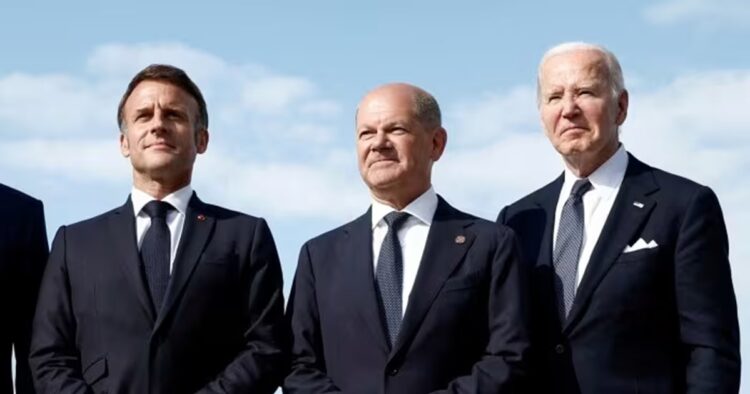As President Joe Biden and his aides planned NATO’s 75th-anniversary summit in Washington, they hoped to send a strong message of unity and strength. This message was directed at Russian President Vladimir Putin and other potential adversaries, showcasing a larger and more dedicated group of Western allies after more than two years of supporting Ukraine in its war against Russia.
However, as 38 world leaders arrived in Washington, the confidence intended for the summit seemed shaky. There is uncertainty about whether Biden will run for a second term, and the possibility of former President Donald Trump returning to power adds to the concern. Trump, who once called NATO “obsolete” and threatened to leave the alliance, has recently suggested he might let Russia act freely against NATO members he feels are not contributing enough.
Biden, now 81, is one of NATO’s strongest advocates. He welcomed the scrutiny of his leadership during an interview with ABC’s George Stephanopoulos, encouraging people to judge him based on his performance at the summit.
As Biden and the leaders meet at the historic Andrew W. Mellon Auditorium, they will be watching for signs of his ability to continue leading for another term.
The summit is a significant test for NATO, which must maintain the momentum it has built in supporting Ukraine. Outgoing NATO Secretary-General Jens Stoltenberg emphasized the importance of political leadership and commitment to keep the alliance strong.
NATO is even setting up a new command to ensure continued support for Ukraine, anticipating the possibility of reduced U.S. involvement under another Trump administration.
While more than 20 NATO members have met the goal of spending 2% of their gross national product on defense, this target now seems insufficient given the ongoing conflict with Russia. European countries, like Germany, have announced plans to upgrade their military capabilities, but have not yet matched these plans with the necessary budgets.
A critical issue at the summit is Ukraine’s potential NATO membership. Last year, Ukrainian President Volodymyr Zelenskyy expressed frustration over the lack of a clear timetable for joining the alliance.
ALSO READ: “Canada Becomes Outlier Among 32-Member NATO Alliance”
Although NATO has promised Ukraine could skip some steps other countries had to take, there is still no set date for membership. The alliance is expected to declare Ukraine’s inclusion as “irreversible,” but this does not satisfy Zelenskyy’s demand for a concrete timeline.
Some NATO leaders, like Hungarian Prime Minister Viktor Orban, have shown sympathy towards Russia despite its invasion of Ukraine. Orban’s recent visit to Russia and his comments about peace negotiations aligned with Russia’s terms were criticized by the White House but not by Stoltenberg, who acknowledged different NATO members’ varied approaches to Moscow.
The 75th anniversary summit of NATO highlights the alliance’s current challenges and uncertainties. As leaders gather to celebrate NATO’s long history, they also face the task of ensuring its future stability and strength amid political, financial, and strategic pressures. The decisions and discussions at this summit will play a crucial role in shaping NATO’s response to ongoing and future threats.

















Comments